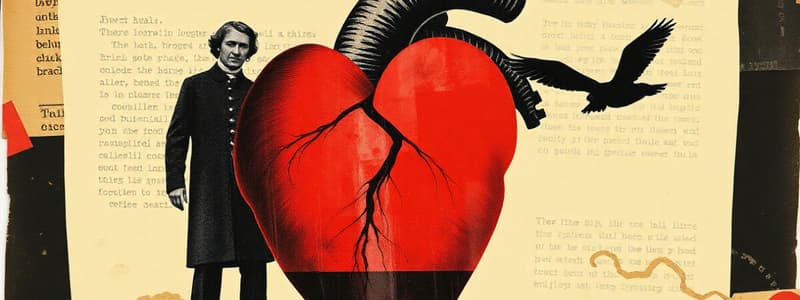Podcast
Questions and Answers
What element of the old man's appearance did the narrator find most unsettling?
What element of the old man's appearance did the narrator find most unsettling?
- His hair
- His skin
- His eye (correct)
- His voice
What was the narrator's primary motive for killing the old man?
What was the narrator's primary motive for killing the old man?
- To avenge a past wrong
- To inherit his fortune
- To eliminate a perceived threat (correct)
- To satisfy a morbid curiosity
What emotion does the narrator claim to be experiencing throughout the story?
What emotion does the narrator claim to be experiencing throughout the story?
- Love
- Fear
- Hatred
- Sanity (correct)
How did the narrator plan to kill the old man?
How did the narrator plan to kill the old man?
What is the significance of the narrator's repeated visits to the old man's room at midnight?
What is the significance of the narrator's repeated visits to the old man's room at midnight?
The narrator's actions can be interpreted as a manifestation of:
The narrator's actions can be interpreted as a manifestation of:
What creates a sense of dread and suspense in the story?
What creates a sense of dread and suspense in the story?
Which one of these is NOT a characteristic of the narrator's personality?
Which one of these is NOT a characteristic of the narrator's personality?
What does the narrator realize as the old man's heart beats louder and louder?
What does the narrator realize as the old man's heart beats louder and louder?
What is a key detail about the old man's eye that adds to the suspense?
What is a key detail about the old man's eye that adds to the suspense?
What does the narrator do to try to conceal the murder?
What does the narrator do to try to conceal the murder?
After the murder, what sound does the narrator become increasingly obsessed with?
After the murder, what sound does the narrator become increasingly obsessed with?
What does the narrator claim about the old man’s last moments?
What does the narrator claim about the old man’s last moments?
When the policemen come to the house, what does the narrator become increasingly obsessed with?
When the policemen come to the house, what does the narrator become increasingly obsessed with?
What is the narrator's state of mind at the end of the passage?
What is the narrator's state of mind at the end of the passage?
What is significant about the phrase “The old man was dead. Dead as a stone.”?
What is significant about the phrase “The old man was dead. Dead as a stone.”?
What does the narrator’s anxiety about the sound suggest?
What does the narrator’s anxiety about the sound suggest?
What effect does the narrator's use of repetition of “louder, louder, louder” have on the reader?
What effect does the narrator's use of repetition of “louder, louder, louder” have on the reader?
Flashcards
Old Man's Fear
Old Man's Fear
The old man's intense fear is palpable and drives the narrator's actions.
Vulture Eye
Vulture Eye
The old man's eye, described as a 'vulture eye', symbolizes death and dread.
Beating Heart
Beating Heart
The sound of the old man's heart represents guilt and anxiety for the narrator.
Narrator's Anger
Narrator's Anger
Signup and view all the flashcards
Death Representation
Death Representation
Signup and view all the flashcards
Policemen's Arrival
Policemen's Arrival
Signup and view all the flashcards
The Confession
The Confession
Signup and view all the flashcards
Insanity Theme
Insanity Theme
Signup and view all the flashcards
The Floorboards
The Floorboards
Signup and view all the flashcards
Sound Symbolism
Sound Symbolism
Signup and view all the flashcards
Narrator's Mental State
Narrator's Mental State
Signup and view all the flashcards
Murder Motivation
Murder Motivation
Signup and view all the flashcards
Nightly Observations
Nightly Observations
Signup and view all the flashcards
Eighth Night
Eighth Night
Signup and view all the flashcards
Old Man's Reaction
Old Man's Reaction
Signup and view all the flashcards
Narrative Tension
Narrative Tension
Signup and view all the flashcards
Psychological Conflict
Psychological Conflict
Signup and view all the flashcards
Study Notes
The Tell-Tale Heart
- Narrator's sanity: The narrator insists on his sanity, claiming the murder was not motivated by hate or greed, but by the old man's eye.
- The old man's eye: The narrator describes the old man's eye as sinister, like a vulture's, causing him intense discomfort and fear. This is the central reason for the narrator's actions.
- Planning and execution: The narrator meticulously planned the murder over seven nights, carefully observing the old man and waiting for the opportune moment.
- Murder details: The narrator describes the act with great detail, including the use of a covered light to target the old man's eye and the placement of the body.
- Fear and guilt: The narrator initially denies any wrongdoing despite an increasing inner turmoil with an audible heartbeat leading to the discovery.
- Police investigation and confession: Police questioning and the narrator's escalating anxiety concerning an audible heartbeat lead to the narrator's confession.
- Auditory hallucination: The narrator's hallucination of the old man's heartbeat is revealed to be the source of his increasing anxiety and distress, culminating in a complete mental breakdown.
- Internal conflict: The narrator's descent into madness is apparent through their extreme anxiety and inability to control their thoughts, culminating in an uncontrollable urge to confess the murder.
Studying That Suits You
Use AI to generate personalized quizzes and flashcards to suit your learning preferences.



